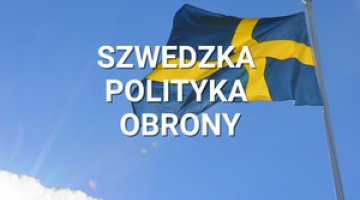Swedish security in crisis
The statements made last December by the Supreme Commander of the Swedish Armed Forces – that in case of limited armed attack Sweden would be able to defend itself for one week – have led to heated public discussions about Sweden’s defence policy and armed forces. These debates are particularly important because of their impact on the ongoing work on Sweden’s security strategy for the period 2015-2018.This work may lead to adjustments to the Swedish government’s current policy and bring about more investment in the defence capabilities of the country, as well as increased cooperation with NATO in Northern Europe. The debate has highlighted the problem resulting from Sweden redefining its defence policy and transforming its armed forces over the last two decades, in a region which is perceived as increasingly unstable. In the 1990s Sweden abandoned its policy of neutrality in armed interstate conflicts, and began to define itself as a non-aligned country, remaining outside military alliances and freely adapting its policies during wartime. The transformation of the Swedish military into an expeditionary force has limited its ability to defend the country. In 2009, Sweden adopted a doctrine of ‘solidarity’ with the EU and Nordic countries, as part of which it also expressed an expectation of assistance from these countries (meaning NATO, however). Nevertheless, recent statements by NATO representatives have challenged the legitimacy of the Swedish government’s policy of solidarity and, in conjunction with the statements by the Swedish Supreme Commander, have highlighted the fact that Sweden is now seeking a new formula to guarantee its own security.
The transformation of Sweden’s defence policy and armed forces
Since the end of the Napoleonic wars, Sweden has described itself as a neutral state. It also remained neutral during the ‘cold war’, and built up robust self-defence capabilities, although in reality it cooperated secretly with NATO countries. The end of the cold war, the process of the integration of Central European countries into the EU & NATO, and Sweden’s accession to the European Union in 1995 led to a fundamental change in the circumstances of Swedish defence policy. The absence of any traditional direct threats to the security of Sweden resulted in a focus on a ‘new type’ of threats and challenges, and on its active participation in an international crisis management policy. As a consequence, defence planning was abandoned and the armed forces were reformed. Sweden reduced the size of its military and adapted it to participation in foreign missions, and also reduced its defence budget. It began to move away from the policy of neutrality, stating that this concept was neither necessary nor sustainable in the new European security environment. In the 1990s, Sweden eventually abandoned neutrality in favour of a policy of non-alignment, i.e. not participating in any military alliances.
The end of the ‘strategic timeout’ and the revision of Swedish defence policy
The Russian-Georgian war in 2008 – together with previous Russian activities in the Arctic region (including the resumption of strategic bomber flights) and cyber-attacks on Estonia – all contributed to a re-evaluation of Swedish defence policy. Sweden noted an increasing instability, and the likelihood of crises in the Baltic Sea and the Arctic regions. The reasons for this included the possibility of rising production and transportation of energy resources, as well as increases in maritime transport and fishing in the context of the reform and modernisation of the Russian army. In its security strategy for 2009, the Swedish government put the maintenance of territorial integrity and political sovereignty on a par with the international crisis management policy. It also committed the armed forces to reintroducing defence planning. The government did not rule out the possibility of crises and conflicts that could directly or indirectly affect Sweden emerging in Northern Europe in the future. At the same time, however, the plans introduced a few years previously to transform the armed forces into an expeditionary model were basically continued.
Perceiving rising insecurity in the region, Sweden has tried to guarantee its security through the adoption in 2009 of a political declaration of ‘solidarity’. The declaration stated that Sweden would not behave passively in the case of ‘disaster or armed attack’ on any EU or Nordic country (i.e. Norway and Iceland), and would expect these countries to do the same. The Swedish armed forces are to be prepared both to give and receive military assistance. This declaration was linked to an increase in military cooperation with the Nordic countries and NATO. The Nordic Defence Cooperation organisation (NORDEFCO), which has been run since 2009 with Norway, Finland and Denmark, was intended to be partly a remedy for defence expenditures which were too low to meet military needs, and also to increase efficiency and make financial savings that could be used for other investments. This is being achieved, but only to a limited extent. An important element of NORDEFCO is the increasing interoperability with neighbours who think similarly about the security challenges, so that the region’s defence capabilities – and thus a possible ‘Nordic solidarity’ – will be strengthened. Sweden has also increased its participation in NATO exercises and operations. The cooperation with NATO is intended to develop the Swedish forces’ interoperability with NATO forces and command structures, which has also been seen as an investment in ‘joint defence capabilities’.
Sweden’s confrontation with reality
The declaration of ‘solidarity’ and the cooperation with NATO have begun to be seen in Sweden as a superficial solution to the security problem. Without questioning the armed forces’ good preparation to participate in military operations abroad, Swedish analysts have begun to question whether the military can effectively defend the country, and also act in the event of crises and conflicts in the region, including in co-operation with NATO. This assessment was confirmed in December 2012 by the Supreme Commander of the Swedish Armed Forces, who stated that in the case of a limited armed attack, Sweden would be able to defend itself for one week. To a Swedish public accustomed to the myth of ‘self-defence’, this analysis came as a shock, and resulted in the most turbulent debates on defence policy among analysts and politicians there had been for years. This debate was reinforced by the NATO Secretary General’s statement in November 2012 that the Alliance is not responsible for the security of countries that are not its members. This effectively undermined the Swedish government’s current rhetoric of ‘solidarity’ (presumably from NATO) in case of an emergency.
Two main camps can be discerned in the Swedish debate. On the one hand, analysts, voices in the military and some politicians (from the smaller Liberal and Christian Democrat parties, who are part of the ruling conservative-liberal coalition) have called for a significant increase in defence spending (which currently stands at US$6.2 billion, or around 1.1% of GDP), an adjustment to reform of the armed forces, and for a serious debate on NATO membership to begin. They also point to the growing threat from an increasingly unstable and re-arming Russia. On the other hand, the largest coalition party (the Moderates), led by Prime Minister Fredrik Reinfeldt, rejects discussions on increasing defence spending at the expense of other expenditures (such as social programmes), with a view to consolidating the state budget and campaigning for next year’s upcoming parliamentary elections. Although the Moderates support NATO membership for Sweden, they do not want a public debate on the subject at this time. The idea of membership is not popular among the general public (30% are in favour, 47% against); nor is there any political agreement to take such a decision. Membership in NATO is also opposed by the Social Democrats, the biggest opposition party, who however now seem open to the idea of a possible increase in military spending. In addition, the Moderates (and the Social Democrats), while noting the troubling trends in Russian policy and Moscow’s rising expenditures on armaments, have played down their direct impact on Sweden’s security.
Prospects for the development of Swedish defence policy
Sweden is currently facing a major challenge: how to shape its defence policy and guarantee the security and sovereignty of the state in a neighbourhood which is perceived as being increasingly unstable. Discussions on various proposals are taking place in Sweden: maintaining the country’s non-aligned status while significantly increasing defence spending and making adjustments to military reform; accession to NATO; the further development of Nordic defence cooperation towards a military alliance; agreeing a Swedish-Finnish defence alliance. However, there is no political and social consensus in Sweden regarding joining NATO – and nor will there be for a long time to come. At present, neither of the major political parties on the Swedish political scene (the Moderates and Social Democrats) want to discuss this subject. Due to the negative positions of Norway and Denmark, the development of Nordic cooperation towards a military alliance is also unlikely, as this would undermine the role of NATO and the US in ensuring security in Northern Europe. Increased Swedish/Finnish cooperation also seems unlikely because of Finland’s caution.
The discussions about Sweden’s security are especially important in the context of the work of the parliamentary Defence Commission, established in 2012; it is preparing recommendations on changes to defence policy and the development of the armed forces. The committee’s reports will form the basis for Sweden’s security strategy for the years 2015-2018. It is difficult to make predictions, but it is likely that in the next few years Sweden will continue to preach non-alignment while at the same time adjusting military reform and increasing defence spending – if the pressure to do so from some political parties and analysts continues. In addition, Sweden will continue to get involved in the development of Nordic cooperation (even though any such cooperation will be accompanied by constraints), and deepen its cooperation with NATO in Northern Europe.
Regional consequences
Changes in Sweden’s defence policy and discourse may contribute to the strengthening of security in the Baltic Sea area. Increased political and military cooperation in the region may act as ‘preventive’ and ‘deterrent’ measures, and allow a coordinated and rapid response in the event of a crisis. Politically, the Swedish perspective on the geopolitical changes in the Baltic Sea and Arctic regions could strengthen those voices in NATO (and even in the EU) which have been warning of growing instability and potential crises on the periphery of NATO and the EU. A platform for strengthening political and regional cooperation in the field of security could be the Northern Group, which brings together the Nordic countries, the Baltic states, Poland, Germany and the United Kingdom. Militarily, Sweden will seek new forms of military cooperation with NATO in the region of Northern Europe which will enhance the interoperability of its forces with those of NATO. Such opportunities may be presented by NATO’s Connected Forces Initiative, which is also open to non-NATO partners.




